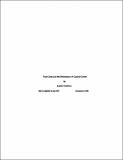| dc.contributor.author | Goolsbee, Austan Dean | en_US |
| dc.contributor.other | Massachusetts Institute of Technology. Center for Energy and Environmental Policy Research. | en_US |
| dc.date.accessioned | 2009-12-16T00:00:36Z | |
| dc.date.available | 2009-12-16T00:00:36Z | |
| dc.date.issued | 1993 | en_US |
| dc.identifier | 93016 | en_US |
| dc.identifier.uri | http://hdl.handle.net/1721.1/50209 | |
| dc.description.abstract | This paper explores the effect that energy prices and market conditions have on the retirement rates of capital goods using new micro data on aircraft lifetimes and fuel costs. The oil shocks of the 1970s made fuel intensive capital like the Boeing 707 a prime target for retirement. The results, based on retirements of 707s from the fleets of the major airline carriers from 1972-1984 are quite robust and show that the oil shock of 1979-1981 made the probability of retirement for a 707 between 5 and 15 times higher. The estimated probability that a 15 year old 707-300C in 1981 would retire before 1982 was 96%. If the oil shock had not occurred this probability of retirement would have been between 8 and 14%. The potentially large effect of energy taxes on capital retirement has important implications for their usefulness and for their potential impact on current airline fleets. | en_US |
| dc.description.sponsorship | Supported by the Center for Energy and Environmental Policy Research at MIT. | en_US |
| dc.format.extent | 29 p | en_US |
| dc.publisher | MIT Center for Energy and Environmental Policy Research | en_US |
| dc.relation.ispartofseries | MIT-CEEPR (Series) ; 93-016WP. | en_US |
| dc.title | Fuel costs and the retirement of capital goods | en_US |
| dc.type | Working Paper | en_US |
| dc.identifier.oclc | 35720943 | en_US |
